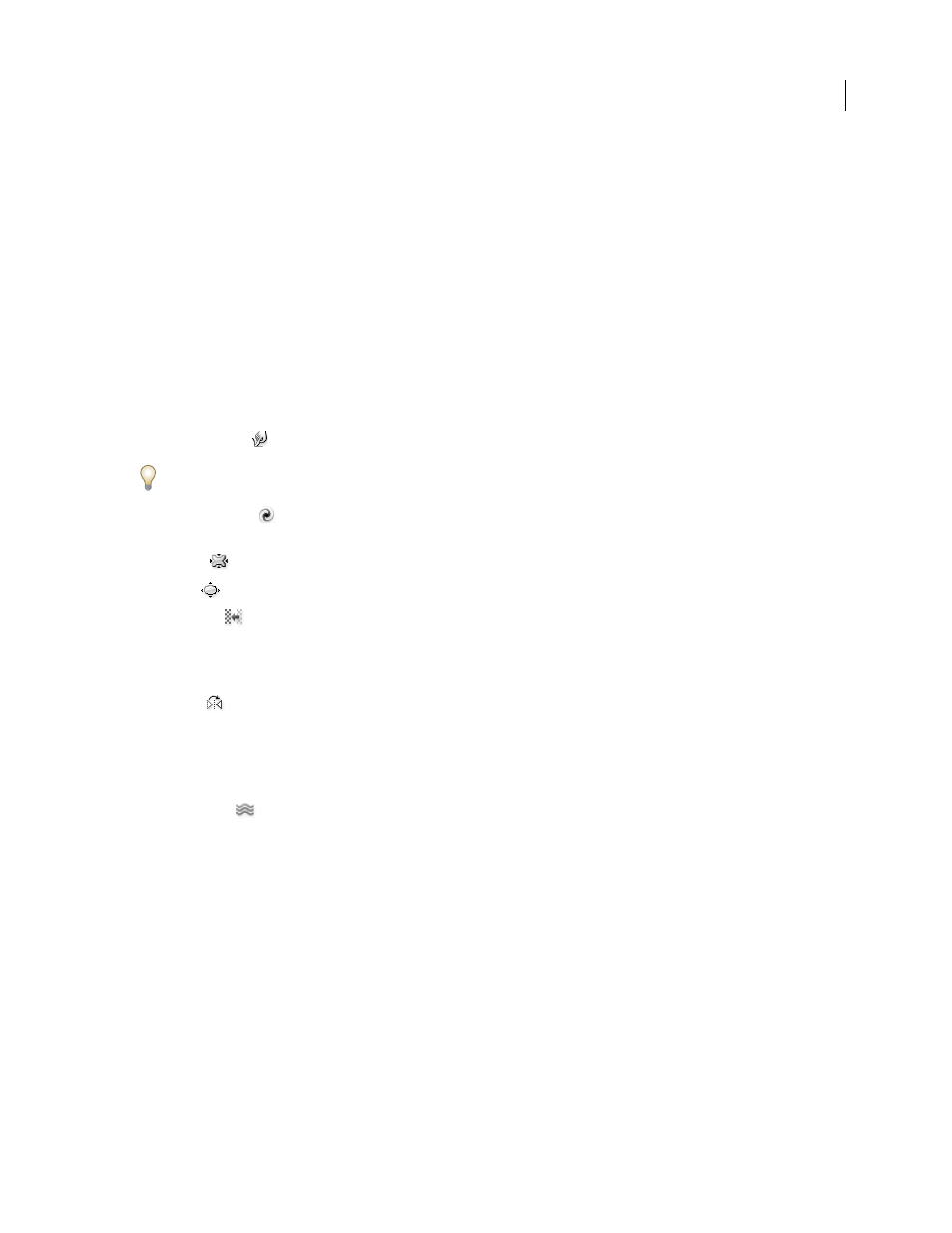Distortion tools – Adobe Photoshop CS3 User Manual
Page 227

PHOTOSHOP CS3
User Guide
220
Magnify or reduce the preview image
❖
Select the Zoom tool in the Liquify dialog box, and click or drag in the preview image to zoom in; hold down Alt
(Windows) or Option (Mac OS), and click or drag in the preview image to zoom out. Alternatively, you can specify
a magnification level in the Zoom text box at the bottom of the dialog box.
Navigate in the preview image
❖
Select the Hand tool in the Liquify dialog box, and drag in the preview image. Alternatively, hold down the
spacebar with any tool selected, and drag in the preview image.
Distortion tools
Several tools in the Liquify dialog box distort the brush area when you hold down the mouse button or drag. The
distortion is concentrated at the center of the brush area, and the effect intensifies as you hold down the mouse
button or repeatedly drag over an area.
Forward Warp tool
Pushes pixels forward as you drag.
Shift-click with the Warp tool, the Push Left tool, or the Mirror tool to create the effect of dragging in a straight line
from the previous point you clicked.
Twirl Clockwise tool
Rotates pixels clockwise as you hold down the mouse button or drag. To twirl pixels
counterclockwise, hold down Alt (Windows) or Option (Mac OS) as you hold down the mouse button or drag.
Pucker tool
Moves pixels toward the center of the brush area as you hold down the mouse button or drag.
Bloat tool
Moves pixels away from the center of the brush area as you hold down the mouse button or drag.
Push Left tool
Moves pixels to the left when you drag the tool straight up (pixels move to the right if you drag
down). You can also drag clockwise around an object to increase its size, or drag counterclockwise to decrease its
size. To push pixels right when you drag straight up (or to move pixels left when you drag down), hold down Alt
(Windows) or Option (Mac OS) as you drag.
Mirror tool
Copies pixels to the brush area. Drag to mirror the area perpendicular to the direction of the stroke
(to the left of the stroke). Alt-drag (Windows) or Option-drag (Mac OS) to mirror the area in the direction opposite
to that of the stroke (for example, the area above a downward stroke). Usually, Alt-dragging or Option-dragging
gives better results when you have frozen the area you want to reflect. Use overlapping strokes to create an effect
similar to a reflection in water.
Turbulence tool
Smoothly scrambles pixels. It is useful for creating fire, clouds, waves, and similar effects.
Liquify tool options
In the tool options area of the dialog box, set the following options:
Brush Size
Sets the width of the brush you’ll use to distort the image.
Brush Pressure
Sets the speed at which distortions are made when you drag a tool in the preview image. Using a low
brush pressure makes changes occur more slowly, so it’s easier to stop them at exactly the right moment.
Brush Rate
Sets the speed at which distortions are applied when you keep a tool (such as the Twirl tool) stationary
in the preview image. The higher the setting, the greater the speed at which distortions are applied.
Brush Density
Controls how a brush feathers at the edge. An effect is strongest in the center of the brush and lighter
at the edge.
Turbulent Jitter
Control how tightly the Turbulence tool scrambles pixels.
